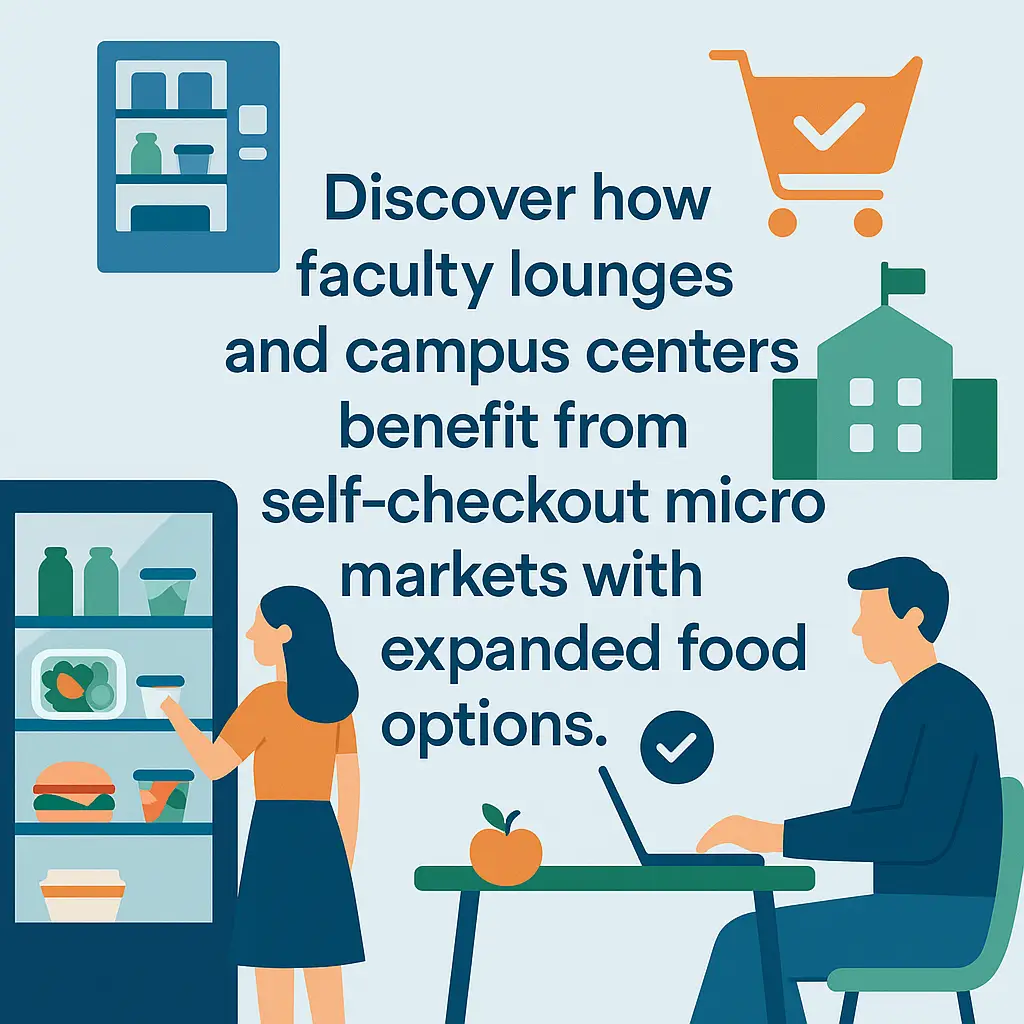Micro Markets in Education Facilities
Discover how faculty lounges and campus centers benefit from self-checkout micro markets with expanded food options.
Back to Vending for Schools ResourcesDiscover how faculty lounges and campus centers benefit from self-checkout micro markets with expanded food options.
Back to Vending for Schools ResourcesCampus centers and lounges benefit from micro markets through flexible meal options, self-checkout convenience, and wider product selections than traditional vending. These markets support healthier choices and create a coffee shop or café-like experience without the overhead of a staffed facility.
![]() Micro markets offer expanded snack, drink, and meal selections
Micro markets offer expanded snack, drink, and meal selections
![]() Contactless checkout improves sanitation and user experience
Contactless checkout improves sanitation and user experience
![]() Smart inventory tracking ensures faster restocks and fewer outages
Smart inventory tracking ensures faster restocks and fewer outages

Schools and universities are turning to micro markets as a smart way to boost food access, convenience, and satisfaction across faculty lounges, athletic centers, and student common areas. These innovative vending options feature open-access coolers, shelf displays, and self-checkout kiosks—offering a modern upgrade to traditional machines.
One of the biggest advantages of micro markets in education environments is the expanded product selection. These systems allow for a larger variety of snacks, cold drinks, healthy options, and ready-to-eat meals, all in one accessible space. This flexibility caters to the diverse tastes of students, faculty, and staff—ideal in places where eating schedules vary widely.
Micro markets also align with today’s contactless and tech-forward expectations. Most markets feature smart kiosks that accept mobile payments, credit cards, and even school-issued ID cards. With 24/7 access and immediate checkout, they’re a great fit for after-hours use in dorms, libraries, and student unions.
Another distinct benefit is the improved service cycle. Unlike basic vending machines that often suffer from expired or low-stock items, micro markets use real-time software to track inventory and automate restocking schedules. This reduces downtime and prevents frustration over empty shelves or broken equipment.
For educational institutions focused on promoting wellness, micro markets can prioritize nutritious, low-sugar, and allergy-friendly items without sacrificing convenience. From protein-packed snacks to meal prep bowls, the expanded capacity supports a better eating experience overall.
When compared to staffed cafés or dining services, micro markets are also cost-effective and require minimal oversight from school administrators. Approved vendors handle the installation, setup, stocking, and servicing—typically at no cost to eligible locations.
For those exploring alternative options, you can also find insights on shift-friendly vending setups or consider low-maintenance machines for smaller spaces.
If you're exploring vending options for your business, Vending Exchange can help simplify the process. Delivery, Installation and Equipment is provided at no cost to you - vendors provide the machines, keep them stocked, and handle all servicing. Whether you need a provider or full-service management, just fill out the form on this page to get started.
Micro markets can stock snacks, beverages, fresh meals, and healthy food options tailored to faculty and students.
Micro markets typically offer self-checkout kiosks that accept contactless cards, mobile pay, and occasionally student IDs.
Yes, student centers benefit greatly from micro markets that provide flexible food choices and fast checkout 24/7.
Yes, most vendors use smart inventory systems to detect low stock levels and service the market accordingly.
Micro markets support contactless payment and avoid keypad-use, offering a more sanitary solution in high-traffic areas.
Micro markets can be scaled to fit small lounges or larger campus centers with flexible modular layouts.
Qualified locations typically get free installation, equipment, and delivery—schools only pay for consumed products.
They offer healthier food alternatives including low-sugar snacks, protein-rich meals, and allergen-aware options.
Yes, markets work well in dorms, offering quick meal and snack access for students outside dining hall hours.
Vendors handle maintenance and repairs; most issues are resolved quickly thanks to real-time monitoring systems.